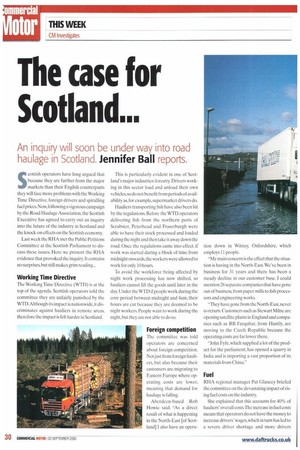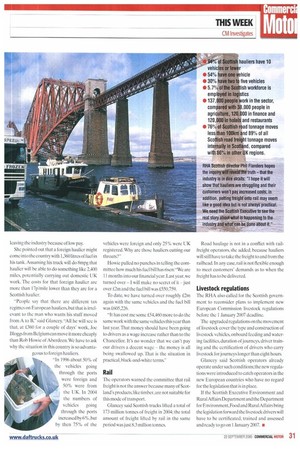The case for Scotland...
Page 30

Page 31

If you've noticed an error in this article please click here to report it so we can fix it.
An inquiry will soon be under way into road haulage in Scotland. Jennifer Ball reports.
Scottish operators have long argued that because they are further from the major markets than their English counterparts they will face more problems with the Working Time Directive, foreign drivers and spiralling fuel prices. Now, following a vigorous campaign by the Road Haulage Association, the Scottish Executive has agreed to carry out an inquiry into the future of the industry in Scotland and the knock-on effects on the Scottish economy.
Last week the RHA met the Public Petitions Committee at the Scottish Parliament to discuss these issues. Here we present the RHA evidence that provoked the inquiry. It contains no surprises, but still makes grim reading_
Working Time Directive
The Working Time Directive (WTD) is at the top of the agenda. Scottish operators told the committee they are unfairly punished by the WTD. Although its impact is nationwide, it discriminates against hauliers in remote areas, therefore the impact is felt harder in Scotland. This is particularly evident in one of Scotland's major industries: forestry. Drivers working in this sector load and unload their own vehicles, so do not benefit from periods of availability as, for example, supermarket drivers do.
Hauliers transporting fish have also been hit by the regulations. Before the WTD operators delivering fish from the northern ports of Scrabster, Peterhead and Fraserburgh were able to have their stock processed and loaded during the night and then take it away down the road. Once the regulations came into effect, if work was started during a block of time from midnight onwards, the workers were allowed to work for only 10 hours.
To avoid the workforce being affected by night work processing has now shifted, so hauliers cannot lift the goods until later in the day. Under the WTD if people work during the core period between midnight and 4am, their hours are cut because they are deemed to be night workers. People want to work during the night, but they are not able to do so.
Foreign competition
The committee was told operators are concerned about foreign competition. Not just from foreign hauliers, but also because their customers are migrating to Eastern Europe where operating costs are lower, meaning that demand for haulage is falling.
Aberdeen-based Rob Howie said: "As a direct result of what is happening in the North-East [of Scotland] I also have an opera tion down in Witney, Oxfordshire, which employs 11 people.
"My main concern is the effect that the situation is having in the North-East. We've been in business for 31 years and there has been a steady decline in our customer base. I could mention 26 separate companies that have gone out of business, from paper mills to fish processors and engineering works.
-They have gone from the North-East, never to return. Customers such as Stewart Milne are opening satellite plants in England and companies such as RB Farquhar, from Huntly, are moving to the Czech Republic because the operating costs are far lower there.
"John Fyfe, which supplied a lot of the product for the parliament, has opened a quarry in India and is importing a vast proportion of its materials from China."
Fuel
RHA regional manager Pat Glancey briefed the committee on the devastating impact of rising fuel costs on the industry.
She explained that this accounts for 40% of hauliers' overall costs.The increase in fuel costs means that operators do not have the money to increase drivers' wages, which in turn has led to a severe driver shortage and more drivers leaving the industry because of low pay.
She pointed out that a foreign haulier might come into the country with 1,360 litres of fuel in his tank. Assuming his truck will do 8mpg that haulier will be able to do something like 2,400 miles, potentially carrying out domestic 1.JK work. The costs for that foreign haulier are more than 17p/mile lower than they are for a Scottish haulier.
"People say that there are different tax regimes on European hauliers, but that is irrelevant to the man who wants his stuff moved from A to B," said Glancey. "All he will see is that, at £360 for a couple of days' work, Joe Bloggs from Belgium can move it more cheaply than Rob Howie of Aberdeen. We have to ask why the situation in this country is so advanta geous to foreign hauliers, -In 1996 about 50% of the vehicles going through the ports were foreign and 50% were from the UK. In 2004 the numbers of vehicles going through the ports increased by 6% ,but by then 75% of the vehicles were foreign and only 25% were UK registered. Why are those hauliers cutting our throats?"
Howie pulled no punches in telling the committee how much his fuel bill has risen:"We are 11 months into our financial year. Last year, we turned over I will make no secret of it-just over Um and the fuel bill was £550,759.
To date, we have turned over roughly £2m again with the same vehicles and the fuel bill was £605,226.
"It has cost me some £54,460 more to do the same work with the same vehicles this year than last year. That money should have been going to drivers as a wage increase rather than to the Chancellor. It's no wonder that we can't pay our drivers a decent wage the money is all being swallowed up. That is the situation in practical, black-and-white terms."
Rail The operators warned the committee that rail freight is not the answer because many of Scotland's products, like timber, are not suitable for this mode of transport.
Glancey said Scottish trucks lifted a total of 173 million tonnes of freight in 2004; the total amount of freight lifted by rail in the same period was just 8.3 million tonnes. Road haulage is not in a conflict with railfreight operators, she added, because hauliers will still have to take the freight to and from the railhead. In any case, rail is not flexible enough to meet customers' demands as to when the freight has to be delivered.
Livestock regulations The RHA also called for the Scottish government to reconsider plans to implement new European Commission livestock regulations before the 1 January 2007 deadline.
The upgraded regulations on the movement of livestock cover the type and construction of livestock vehicles, onboard feeding and watering facilities, duration of journeys, driver training and the certification of drivers who carry livestock for journeys longer than eight hours.
Glancey said Scottish operators already operate under such conditions; the new regulations were introduced to catch operators in the new European countries who have no regard for the legislation that is in place.
If the Scottish Executive Environment and Rural Affairs Department and the Department for Environment, Food and Rural Affairs bring the legislation forward the livestock drivers will have to be certificated, trained and assessed and ready to go on 1 January 2007. •










































































































































































































